Oxygen dissociation curve - Study guides, Revision notes & Summaries
Looking for the best study guides, study notes and summaries about Oxygen dissociation curve? On this page you'll find 845 study documents about Oxygen dissociation curve.
Page 3 out of 845 results
Sort by
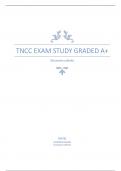
-
TNCC EXAM STUDY GRADED A+
- Exam (elaborations) • 11 pages • 2024
-
- £5.68
- + learn more
TNCC EXAM STUDY GRADED A+1.What is the effect of hypothermia on the oxyhemoglobin dissociation curve Hemoglobin does not readily release oxygen for use by the tissues A shift to the left occurs in an environment of low metabolic demand (hypothermia, hypocapnia, alkalosis), increasing hemoglobin's affinity for oxygen.
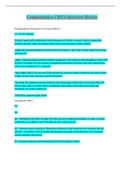
-
Comprehensive CRNA Interview Review Accurate responses are given.
- Presentation • 70 pages • 2023
-
- £15.42
- 3x sold
- + learn more
Comprehensive CRNA Interview Review Accurate responses are given. Comprehensive CRNA Interview Review Norepinephrine Mechanism of Action (MOA) A1, A2, B1 agonist. Primary agent used in distributive shock because it's ability to recruit venous volume and augment preload, while increasing arterial tone, and increasing cardiac output. Alpha one causing peripheral smooth muscle contraction. (low dose venous, high dose venous and arterial). Alpha 2 adrenoreceptor agonism actually ant...
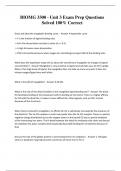
-
BIOMG 3300 - Unit 3 Exam Prep Questions Solved 100% Correct
- Exam (elaborations) • 15 pages • 2024
-
- £10.14
- + learn more
Draw and label the myoglobin binding curve. - Answer A hyperbolic curve -> Y is the fraction of ligand-binding sites -> Kd is the dissociation constant (x value of y = 0.5) -> A high Kd means more dissociation. -> P50 is the partial pressure when oxygen (or something) occupies 50% of the binding sites. What does the hyperbolic shape tell us about the sensitivity of myoglobin to changes in ligand concentration? - Answer Myoglobin is very sensitive to ligand and will take up a lo...
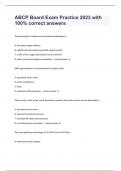
-
ABCP Board Exam Practice 2023 with 100% correct answers
- Exam (elaborations) • 58 pages • 2023
-
- £12.58
- + learn more
The advantage of continuous warm blood cardioplegia is: A: increased oxygen delivery B: significantly decreased myocardial oxygen tension C: a shift of the oxygen dissociation curve to the left D: lower myocardial oxygen consumption - correct answer A IABP augmentation is contraindicated in patients with: A: prosthetic aortic valves B: aortic insufficiency C: VSDs D: peripheral atherosclerosis - correct answer B When using a roller pump. aortic dissection caused by the aort...
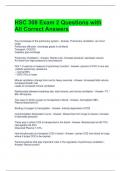
-
HSC 308 Exam 2 Questions with All Correct Answers
- Exam (elaborations) • 11 pages • 2024
- Available in package deal
-
- £10.63
- + learn more
HSC 308 Exam 2 Questions with All Correct Answers Four processes of the pulmonary system - Answer- Pulmonary ventilation- air in/out lungs Pulmonary diffusion- exchange gases in air/blood Transport- CO2/O2 Capillary gas exchange Pulmonary Ventilation - Answer- Boyles Law- Increase pressure, decrease volume Air flows from high pressure to low pressure FEV 1.0 used as a measure of pulmonary function - Answer- percent of FVC in one sec -reflects pulmonary resistance ---normal 85% ---...
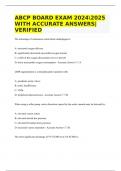
-
ABCP BOARD EXAM 20242025 WITH ACCURATE ANSWERS|VERIFIED
- Exam (elaborations) • 59 pages • 2024
-
- £13.39
- + learn more
ABCP BOARD EXAM 20242025 WITH ACCURATE ANSWERS|VERIFIED The advantage of continuous warm blood cardioplegia is: A: increased oxygen delivery B: significantly decreased myocardial oxygen tension C: a shift of the oxygen dissociation curve to the left D: lower myocardial oxygen consumption - Accurate AnswerA IABP augmentation is contraindicated in patients with: A: prosthetic aortic valves B: aortic insufficiency C: VSDs D: peripheral atherosclerosis - Accurate AnswerB When ...
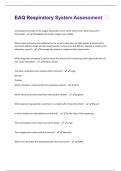
-
EAQ Respiratory System Assessment Questions And Answers Rated A+ New Update Assured Satisfaction
- Exam (elaborations) • 9 pages • 2024
- Available in package deal
-
- £6.49
- + learn more
According to principles of the oxygen dissociation curve, which event occurs when tissue pH is decreased? - Hemoglobin dissociates oxygen more rapidly Which action will be the most effective for the nurse to take when an older patient presents with a decreased ability to cough and decreased alveolar surface area, and diffusion capacity is noted on the laboratory reports? - Encourage the patient to cough and take deep breaths Which diagnostic procedure is used to assess the amount of air rem...
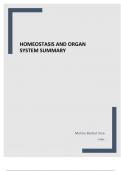
-
HOMEOSTASIS AND ORGAN SYSTEM (BBS1002): cases, lectures, and practicals
- Case • 110 pages • 2024
-
- £4.70
- 1x sold
- + learn more
CASE 1 & LECTURE 1: BLOOD SYSTEM CASE 2 & CASE 3 & LECTURE 4 & DISSECTION 1 & VIRTUAL MICROSCOPY 1: HEART CASE 4 & CASE 5 & LECTURE 5 & DISSECTION 2 & VIRTUAL MICROSCOPY 2: LUNGS CASE 6/CASE 7/LECTURE 6/DISSECTION 3/VIRTUAL MICROSCOPY 3: DIGESTIVE SYSTEM CASE 8/CASE 9/DISSECTION 4/VIRTUAL MICROSCOPY 4: KIDNEY CASE 10: pH HOMEOSTASIS
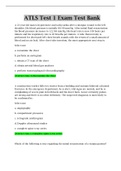
-
ATLS Test 1 Exam Test Bank (340) Questions With Complete Solution
- Exam (elaborations) • 65 pages • 2023
- Available in package deal
-
- £10.55
- 3x sold
- + learn more
ATLS Test 1 Exam A 22-year-old man is hypotensive and tachycardic after a shotgun wound to the left shoulder. His blood pressure is initially 80/40 mm Hg. After initial fluid resuscitation his blood pressure increases to 122/84 mm Hg. His heart rate is now 100 beats per minute and his respiratory rate is 28 breaths per minute. A tube thoracostomy is performed for decreased left chest breath sounds with the return of a small amount of blood and no air leak. After chest tube insertion, the most ap...
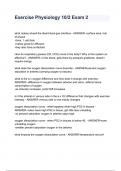
-
Exercise Physiology 10/2 Exam 2
- Exam (elaborations) • 8 pages • 2024
- Available in package deal
-
- £6.49
- + learn more
what makes alveoli the ideal blood-gas interface - ANSWER--surface area, lots of alveoli -think, 1 cell thick -makes good for diffusion -they also have surfactant How do respiratory gasses (O2, CO2) move in the body? Why is this system so effective? - ANSWER--in the blood, gets there by pressure gradients, doesn't require energy what does the oxygen dissociation curve describe - ANSWER-percent oxygen saturation in arteries (carrying oxygen to tissues) what is the a-v oxygen difference...

How did he do that? By selling his revision notes on Stuvia. Try it yourself! Discover all about earning on Stuvia


